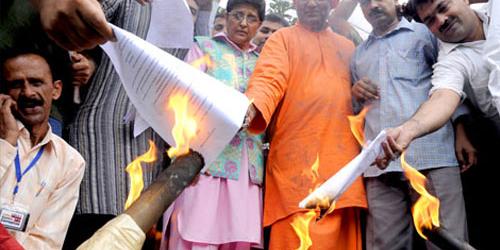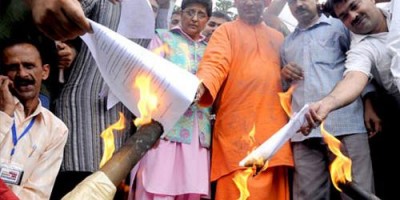Sadiq Naqvi Delhi
In an exclusive conversation with Sadiq Naqvi, Harsh Mander, Member, NAC and NCPRI, expresses his worry over Prashant Bhushan and Swami Agnivesh standing by Rightwing communal and anti-reservation forces…
What is your analysis of the movement?
This movement has taken a shape which is beyond the specifics of the demand being made and the expectations of its organisers. We must recognise and respond appropriately to what it has grown into. More than the idea of corruption, this movement has grown to be about how we treat democratic dissent in this country. The heart of any democracy is not just the right to vote; it’s as much the right to dissent peacefully. Many laws and policies have come through social movements. The instinctive reaction of the government to crush, divert or trivialise was a huge mistake that contributed largely to the success of the movement. It was wrong — ethically, institutionally, administratively. It was a blunder. The people have the right to assert themselves and the government must listen to them without arrogance and with humility.
However, the organisations behind this movement are also showing extreme intolerance of diverse opinions. One thing I have learnt from my association with Right to Information, NREGA, Right to Food, Communal Violence Bill etc, is that if we had insisted that our view was the only correct view, we would have committed a huge mistake and the end result would have been far weaker. Right from the start they should have dealt with the diverse beliefs and opinions, especially of people like us who regard themselves as their friends. We don’t even call ourselves dissenters. They should have been more friendly in the exchange of views. And then, there is the issue of the role of Parliament, of democratic processes. The government was wrong to say that only Parliament can make laws. It happens in societies, it happens in Parliament. But when there are disagreements, then we should let Parliament decide. Tomorrow someone can come with 10,000 people, another can come with one lakh. We have seen moments of frenzy. The crowds have the right to demand. They do not have the right of veto over laws and the Constitution. Moreover, I have been maintaining that the movement has a leaning to the Right, with visible sympathy for Rightwing social and political formations. And the Rightwing is not just communal but also anti-reservation. While the initial mobilisation was done by these groups and also supporters of Sri Sri Ravishankar and Baba Ramdev, it would be blind for us to say that is all there is to what we are seeing on the streets.
Are these people trying to build a parallel mechanism to NAC as they think that like NAC, they too have a right to push their draft?
The comparison with NAC is not appropriate as it is not a self-appointed body. The government has a number of official advisory bodies and NAC is one of them. It’s appointed by government. The idea was to constitute a group to advise on legislations and social policy for the poor and the disadvantaged. Only three or four of us can be classified as civil society members or jholawalas, but there are also MPs, academics, Planning Commission members, industrialists and so on — it’s a diverse set of people. NAC’s advice is just that — advice — and we have seen over the past year how freely the government can reject such advice. And after that we are free as individuals to go to the standing committee of Parliament and press our views.
You talked of Rightwing leanings. Can you please specify? And do you see it as an attempt to topple the government?
The contribution of ABVP and RSS to the mobilisation is fairly clear. That explains part of the story even as there is a great deal of spontaneous mobilisation as well. But that is where I think a lot of it started — the initial symbols, the kinds of people who were invited, who spoke, a lot of them reflected these ideologies. There were statements lauding people like Narendra Modi for running an ideal government — encounter killings or suppression of evidence to subvert the process of justice are not considered part of the definition of corruption. I have a serious problem with that. But the movement has indeed evolved from that into something with a greater and wider ranging quality. Any opposition party would take this opportunity to discredit the government in power and so the parties are doing that openly. Worryingly, those who talk of corruption, don’t talk about corruption in, say, Karnataka as loudly as they do here. On the other hand, in that state it was the Lokayukta who exposed corruption. In fact, the more dangerous kind of support has come from anti-reservation groups like Youth for Equality.
Many in Team Anna seem to have changed their earlier political stance. Your comments.
I’m surprised at the attitude; in fact, all those in the group, except Anna whom I don’t know personally, are good friends and people I regard highly. But people like Prashant Bhushan and Swami Agnivesh have been part of other movements and it is worrying that they are standing by people who do not match them ideologically. I think they’re doing it because perhaps they are impatient with the corruption all around.
Do you think Lokpal is the only solution to the problems as claimed by Team Anna?
The promise that 60 per cent of corruption will go with Lokpal is totally misleading. Corruption is a complex phenomenon, Lokpal is one of the punitive measures. But they cannot act alone. Administrative reforms, transparency, police reforms, decentralisation, judicial reforms, all these are required, and then what we need is social reforms — looking at how we treat our children and bring them up etc.
Did you try to communicate your differences to Team Anna?
We tried throughout. We are friends and comrades. They haven’t been very forthcoming, except Prashant, who had two or three meetings with us, but has not been convinced.
Do you think people who have reservations with Team Anna’s Jan Lokpal or this movement are afraid to speak out?
The massive popular support and media coverage has stunned everyone, so it has become increasingly difficult and unpopular to express concerns — even if it’s not opposition, but just some nuanced concern. People are attacked for doing it. Also, party people might be saying that we might not be seeing it, but there must something good that will come out of all this.
Where is this campaign headed, given the tough stance of Team Anna?
Both the government and Team Anna should be willing to compromise. Ideally, Team Anna should be willing to accept the standing committee procedures. Indeed, the government should constitute a larger group and a more sensible one, with people from all political parties across the spectrum and members with diverse opinions, and then open up the debate. If both sides adopt a flexible position, then we would have an answer to where this is headed.
Do you agree with the argument, “We have the crowd, so we are democratic”?
I think that large numbers have done many good things. But then, large numbers also pulled down Babri Masjid. Just having large numbers is no evidence of being right. You can be in a minority of one and still be right.
Courtesy: Hardnews (http://www.hardnewsmedia.com/2011/08/4093)























